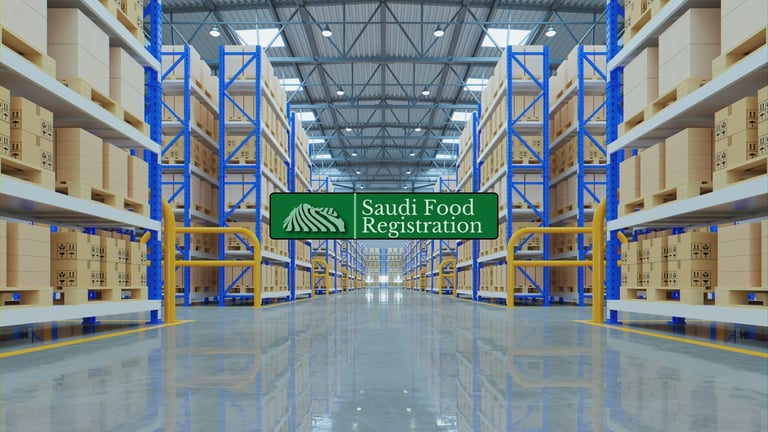Master Saudi Food Import Quotas
Master KSA's food import quotas with practical guidance, tips, and expert tools to simplify compliance and ensure market success with Saudi Food Registration.
12/27/20243 min read


Mastering Saudi Arabia's Food Import Quotas: Practical Tips for Success
Key Takeaways
Saudi Arabia's import quotas regulate market entry, ensuring balance between local and international products.
Detailed documentation and compliance with SFDA standards are critical.
Proactive strategies, smart tools, and local partnerships are essential to avoid delays and overages.
Understanding Saudi Arabia's Import Quotas: Why They Matter
Navigating Saudi Arabia's food import quotas is key to entering one of the Middle East's most lucrative markets. These quotas aren't just bureaucratic barriers—they’re designed to:
Protect Local Industries: Ensuring local food producers thrive while meeting growing consumer demand.
Maintain Food Safety and Quality: Ensuring imported products meet Saudi Arabia's high standards.
Balance the Market: Preventing oversupply in certain categories, which could disrupt the economy.
Breaking Down Import Quotas: What You Need to Know
Product Categories: What’s Impacted?
Each product type is subject to unique regulations and quota restrictions. Here’s a closer look:
Fresh Produce: Seasonal quotas align with local harvests, requiring careful timing for imports.
Processed Foods: Typically face more consistent quotas, but documentation requirements are stringent.
Meat and Poultry: Subject to detailed Halal certification checks and rigorous inspections.
Understanding your product’s category and its specific quota limits is critical to avoid overages or rejections.
The Role of Documentation: Get It Right the First Time
Meeting Saudi Arabia’s documentation requirements can feel overwhelming, but preparation is your best tool. Here’s your checklist:
Origin Certificates: Highlighting where your product was manufactured and sourced.
Detailed Ingredient Lists: Must align with SFDA guidelines and include allergen declarations.
Halal Certification: Essential for meat, poultry, and certain processed foods, issued by SFDA-recognized bodies.
Logistics Documentation: Including customs clearance papers, invoices, and transport records.
Practical Strategies to Overcome Import Challenges
1. Stay Ahead of Regulatory Changes
The Saudi Food and Drug Authority (SFDA) regularly updates its requirements to reflect evolving food safety standards. To stay compliant:
Set up alerts for SFDA updates.
Join industry-specific trade associations to access shared resources and insights.
2. Embrace Digital Tools for Compliance
Avoid costly errors by leveraging advanced import management systems:
Quota Tracking Tools: Alert you when you're nearing quota limits.
Document Automation: Reduces human error and ensures all paperwork meets Saudi standards.
Customs Submission Systems: Allow for real-time updates and tracking of shipment approvals.
3. Partner with Local Experts
Navigating Saudi Arabia’s regulatory and cultural landscape is easier with local support. Benefits include:
Insight into Cultural Norms: Helps avoid unintentional offenses in product presentation or labeling.
Pre-emptive Problem Solving: Local partners can anticipate and address potential issues before they escalate.
Faster Approval Processes: Direct communication with SFDA and customs officials streamlines registrations.
How Saudi Food Registration Simplifies the Process
Our team is dedicated to turning complex import processes into seamless experiences. Here's what sets us apart:
Real-Time Regulatory Updates: We monitor quota changes and adjust strategies proactively.
End-to-End Documentation Support: From preparing certificates to ensuring Halal compliance, we handle every detail.
Local Partnerships: Our deep connections with Saudi regulatory bodies ensure smoother and faster approvals.
Key Takeaways for Success
Be Proactive: Understand quota categories and plan imports accordingly.
Leverage Technology: Use digital tools to streamline documentation and compliance tracking.
Build Relationships: Partner with local experts who can navigate Saudi Arabia's unique regulatory environment.
Ready to Navigate Saudi Import Quotas Like a Pro?
Don’t let regulatory complexities slow your entry into the Saudi food market. Whether you're planning your first shipment or optimizing existing processes, our experts are here to guide you.
Schedule a free consultation today to learn how we can simplify your import journey and maximize your market opportunities.
Contact us by clicking here or use our Chatbot in the bottom right corner of your screen and one of our experts will get back to you as soon as possible.
Further Readings
Saudi FMCG Registration Requirements: A Step-by-Step Guide: Learn how to position your FMCG products for success in Saudi Arabia's growing market.
Master SFDA Labeling Standards: Discover essential guidelines for labeling compliance in Saudi Arabia and ensure your products meet SFDA requirements seamlessly.
Product Registration Crisis Guide: Master Crisis Management for food product registration in KSA.
Get 2025-ready with our Top Food Registration Tips for compliance and success.
